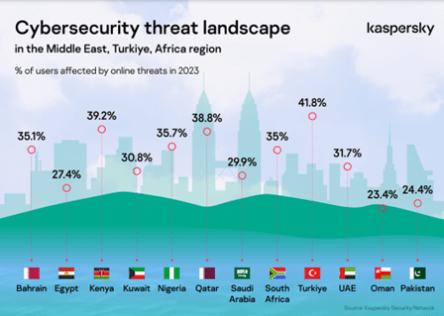In 2023, Kaspersky reported 6% growth in B2B sales in the Middle East region and successfully blocked a total of 30 million threats in the UAE. Both these figures clearly show that organizations are determined to enhance their cybersecurity readiness in the view of growing sophisticated cyberthreats. Since education is key to raising cybersecurity awareness, the company has partnered with several government entities such as The UAE Cyber Security Council to amplify our efforts across all sectors, said Rashed Al Momani, General Manager at Kaspersky Middle East.

He was speaking at the company’s 9th annual cybersecurity weekend held in Kuala Lumpur, Malaysia.
At the event, Kaspersky experts delved into the ever-evolving cyberthreat landscape in the region and the security implications of emerging technologies like AI, which significantly impact the scale of contemporary threats. Simultaneously, attention was directed towards threats targeting industrial control systems within critical infrastructure in the Middle East, Africa, and Asia. The spotlight was on Kaspersky’s Cyber Immunity approach, emphasizing the development of solutions practically impervious to compromise and minimizing potential vulnerabilities.
In the context of the United Arab Emirates, Kaspersky’s telemetry revealed a 20% decrease in overall cyberthreats in 2023 compared to 2022. However, there was a noteworthy 70% increase in phishing attacks employing social engineering tactics to trick individuals into disclosing sensitive information. Further analysis of the UAE’s threat landscape unveiled a 53% rise in attacks using exploits targeting specific vulnerabilities between Q4 and Q3 of 2023. Ransomware attacks, aiming to encrypt a victim’s data for ransom, surged by 86%, while spyware attacks, involving the infiltration of malicious software to gather and share data, increased by 44%. Additionally, backdoor attacks, providing unauthorized access by bypassing security measures, witnessed a notable 55% uptick.
According to Kaspersky’s analysis, online threats caused by vulnerabilities on web pages, in emails or webservices, have fluctuated significantly in the region. Turkiye saw the highest number of users affected by online threats (41.8%), followed by Kenya (39.2%), Qatar (38.8%) and South Africa (35%). Fewer users were affected in Oman (23.4%) and Egypt (27.4%) followed by Saudi Arabia (29.9%) and Kuwait (30.8%).
“As the cybersecurity landscape evolves, cyber threats continue to become diverse and sophisticated. This trend is particularly evident due to the emergence of advanced technologies like AI and the escalating geopolitical and economic turbulence within the META region. These factors collectively contribute to the surge in cybercrime and the heightened complexity of cyberattacks,” said Amin Hasbini, Director of META Research Center Global Research and Analysis Team (GReAT), at the event.





